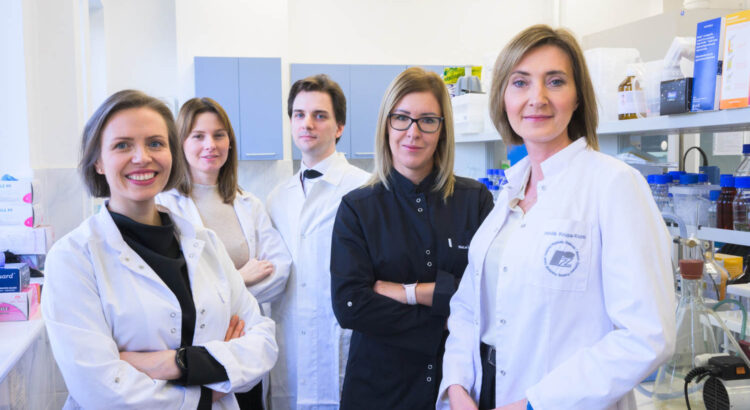The gut microbiota plays a fundamental role in shaping our health. When its structure and function are disrupted, health problems can arise. Prebiotics and probiotics are helpful in restoring its balance. Researchers from the Institute of Animal Reproduction and Food Research of the Polish Academy of Sciences in Olsztyn are investigating how supplementation with a prebiotic derived from chicory improves the health of patients with psoriasis.
– We hypothesise that rebalancing the gut microbiota and proper functioning of the intestinal barrier in people with psoriasis will alleviate the symptoms of inflammation and the severity of skin lesions seen in this chronic dermatitis – explains Dr Urszula Krupa-Kozak.
RESTORE THE BALANCE
The intestinal microbiota is a rich and diverse assemblage of microorganisms residing in the gastrointestinal tract that enable the digestion of food, support the proper functioning of the immune system and protect against invasion by pathogenic organisms.
– It is a complex ecosystem residing in our body, without which we are unable to stay healthy. Its close interaction with the intestinal epithelium enables the formation of immune mechanisms. The gut microbiota plays an important role in maintaining the integrity of the intestinal epithelium – that is, the selective barrier that, on the one hand, separates the immune cells located in the intestinal mucosa from the microorganisms present in the intestinal lumen and, at the same time, enables metabolites of the microbiota to interact with host cells, thereby regulating the immune response – explains a scientist from the Department Chemistry and Biodynamics of Food.
An imbalance of the intestinal microbiota (dysbiosis) can therefore result in an increase in the permeability of the intestinal barrier and consequently be the cause of the development of inflammation.
Plaque psoriasis is a chronic immune-mediated dermatitis. It is a non-communicable disease, affecting approximately 2-3% of the world’s population, regardless of gender or age. It manifests as scaly, itchy and reddened skin. In most cases (approximately 70-80%), psoriatic lesions are mild and do not require systemic treatment.
– The pathogenesis of psoriasis is not yet fully understood. Recent research suggests that the increased immune response responsible for the systemic inflammation seen in this disease may be a consequence of the aforementioned intestinal dysbiosis – points out Urszula Krupa-Kozak.
DIETARY SUPPORT
Attempting to prove this relationship is one of the main tasks of a project just started by scientists from the Institute of Animal Reproduction and Food Research of the Polish Academy of Sciences in Olsztyn.
– Diet and its components have a very strong influence on the course of psoriasis. Proper nutrition is a method to help counteract complications accompanying this disease, such as metabolic disorders, obesity or diabetes. Through a nutritional intervention using a prebiotic, we want to support the microbiome of our patients – emphasises the researcher.
Scientists have investigated a prebiotic derived from chicory: inulin-type β-fructans, which occurs naturally in onions, garlic, bananas or asparagus. – Numerous scientific studies have shown that it is a prebiotic that beneficially alters the composition and activity of intestinal microbes and alleviates intestinal inflammation. It has also proven itself in patients with coeliac disease, which is what I dealt with in a previous project – says Urszula Krupa-Kozak.
Prebiotics nourish the microorganisms that naturally reside in our digestive tract, mainly in the large intestine. Thanks to prebiotics, the beneficial probiotic bacteria increase their numbers and more actively produce their metabolites, mainly short-chain fatty acids, which have a beneficial effect on the body. These bacterial metabolites show anti-inflammatory effects by influencing the function and activity of immune cells.
– The aim of our study is to determine whether dietary supplementation with inulin-type β-fructans derived from chicory will provide measurable health benefits to patients with psoriasis. We will test whether these benefits result from modification of the composition and activity of the gut microbiota,” the researcher reports.
To achieve this goal, the team led by Dr Urszula Krupa-Kozak will conduct an original, advanced and complex study involving approximately 70 patients with psoriasis who will take the supplement for eight weeks. The study will include, among other things, characterisation of their gut microbiota, assessment of gut barrier function, analysis of selected biomarkers and metabolic parameters, which the researchers suspect will help to elucidate the nature of the interaction between the gut microbiota and the skin, providing clues to the functioning of the gut-skin axis.
– If our hypothesis proves itself and we show that this prebiotic has a beneficial effect on the study parameters, the results of our research will be able to contribute to the development of dietary recommendations that can be used to treat patients with psoriasis – concludes Urszula Krupa-Kozak.
PROJECT LAUNCH
The research is being carried out as part of the project ‘Effect of intestinal microbiota modulation induced by the chicory inulin-type β-fructans on metabolic parameters and biomarkers of the gut-skin axis in chronic skin inflammation’, funded by the National Science Centre (NCN).
The leader of the project is the Institute of Animal Reproduction and Food Research of the Polish Academy of Sciences in Olsztyn. Partners: the School of Medicine of the University of Warmia and Mazury in Olsztyn (team of dermatologists from the Department and Clinic of Dermatology, Sexually Transmitted Diseases and Clinical Immunology under the direction of Prof. Agnieszka Owczarczyk-Saczonek) and the Institute of Human Nutrition Sciences of the Warsaw University of Life Sciences (team from the Department of Dietetics under the direction of Prof. Ewa Lange).
The amount of funding is more than PLN 2 million. The project is expected to be completed in 2027.
